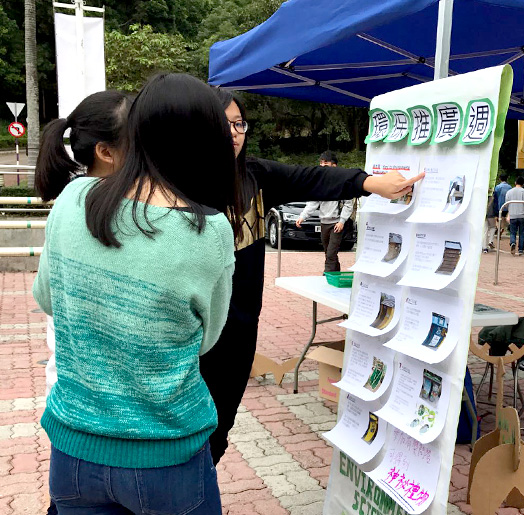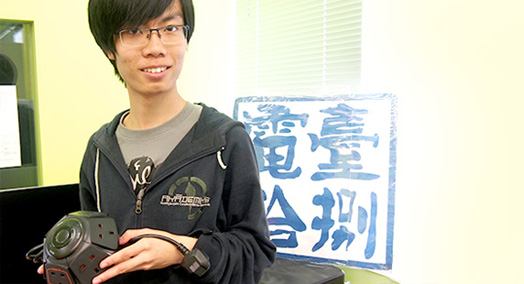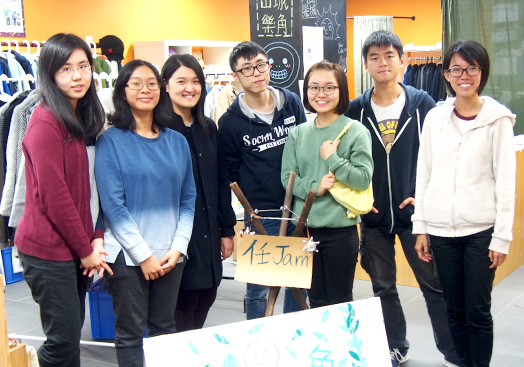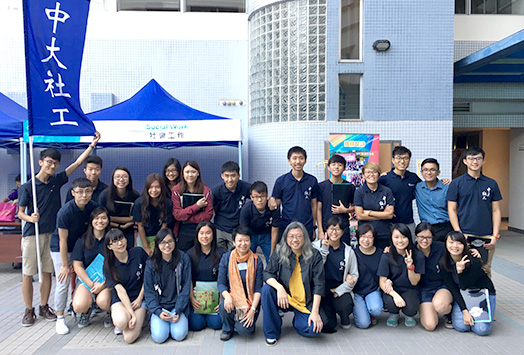
‘Soc’ Much the Better—Green Student Society Scheme Challenges Student Societies to Go Greener
Joining a club or society at university is a great way to make friends, develop one’s interests, take a break from studies and in short, get a life. It can also be a good start to helping the planet become greener, even if one’s society is not a self-proclaimed ‘green’ group.
Becoming involved in a university society or group, and in particular holding a position of responsibility on the committee, offers opportunities to make decisions on the group’s operations and organize events, and therein also lies the opportunity to exercise the green mindset and make the society not only better, but more environmentally-friendly as well.
To encourage student societies to explore ways to make their operations and events greener, the University launched the ‘Green Student Society Scheme’ (or ‘SO Green!’, for short) in February last year. The Scheme allows student societies to get reimbursed (up to $1,000) for implementing measures to make their daily operations or events greener, or organizing events with a sustainability-related theme.
Last year, 25 student societies including interest groups, departmental societies, hostel resident associations and volunteer service teams joined ‘SO Green!’. These ‘SO Green!’ members have requested reimbursement for different types of expenses, from event staples like reusable banners to more novel items like energy-saving power strips.
The main requirement for members of ‘SO Green!’ is that they must pledge to implement at least 10 of the 20 green actions in the ‘SO Green! Action List’ provided by the Scheme during the Scheme period of May to November, and complete an online form at the end of the Scheme to report actions they have undertaken, with photos as proof for some actions. Most of the actions in the ‘SO Green! Action List’ are simple and pertain to common activities undertaken by societies. They can be divided into four categories:
- Energy Conservation: e.g., turning off unused lightings, air conditioners and electrical equipment (including the standby mode) when leaving society rooms / event venues;
- Waste Reduction: e.g., designing promotional materials (e.g., banners) that can be reused by the next committee;
- Event Planning and Management: e.g., reminding event participants to support ‘BYOB’ campaign and bring their own water bottles, and
-
Green Purchasing: e.g., using second-hand materials whenever possible.
Prizes will be awarded to the three societies that have completed the highest number of green actions in the ‘SO Green! Action List’. The green champions of ‘SO Green!’ in 2016 are Campus Radio, CU Happy Corner, and the Social Work Society.
Sin Long-ching, president of Campus Radio, shared, ‘Our society room is quite spacious, which inspired us to try out some green ideas. We joined “SO Green!” as many of the actions it recommended seemed suitable, and the additional budget enabled us to buy energy-saving power strips. These devices help reduce standby power drain by turning off the power supply of peripheral equipment like monitors automatically when we power down the main computer; they offer surge protection, too; both are important given the number of electronics in our office.’


CU Happy Corner, another ‘SO Green!’ champion that runs a student co-op for exchange of second-hand goods, furnished the co-op mostly with second-hand items such as cabinets, a fridge and a microwave oven. ‘We try to create a space that emphasizes reuse and sharing. To help visitors to our co-op to feel welcome, we set up a corner that allows students to refill their water bottles, get free tea bags and re-heat their food using the microwave oven,’ said Wong Ka-po, student shopkeeper of CU Happy Corner.
‘Many items can be shared among the student societies too so that different parties don’t have to buy them individually. For example, our fridge is currently used by another society,’ she continued.
The co-op extends its sharing spirit by giving away reusable shopping bags made of second-hand T-shirts outside its store. According to the shopkeepers, the response has been fantastic, thanks to the co-op’s proximity to the supermarket.
Even societies without much office space can adopt green practices that help reduce waste and save money. Li Cheuk-lam, financial secretary of Social Work Society, said, ‘We reuse the same banner where possible, but in case we really need a banner for a specific event, we have a blank banner that we customize by putting text and graphics on it.’
‘SO Green!’ members are encouraged to report any green initiatives not described in the ‘SO Green! Action List’. Participants have shared some interesting initiatives via the online form. Examples are: using baking soda as an eco-friendly cleaner during camping events; facilitating the freecycling of second-hand items, opting for a less meaty catering menu to lower the carbon footprint, and designing event souvenirs to be less resource-intensive. The University will take note of these best practices and promote them to student bodies where suitable.

Committee members of all student societies that fulfill the requirements of ‘SO Green!’ will be invited to a free eco-tour in spring 2017. While the incentives and prizes to be offered by ‘SO Green!’ in the coming years are subject to change based on availability and changes in societies’ preferences, the core message will remain the same: all student societies can help the Earth by going green, and we will support those who are ready to make a difference!


